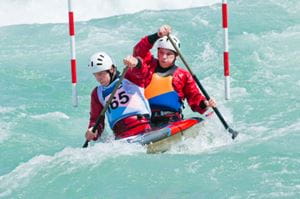MBTI and sport
helenrayner

The Games are in full swing and at the time of writing, Team GB has won 48 medals (22 gold, 13 silver and 13 bronze). Here at OPP we have been discussing the role of personality in sports. (For the purposes of this post, we are not counting biscuit eating and cake devouring as sports; though some of us do consider ourselves experts in these pursuits!)
When it comes to the MBTI, we decided that SPs might be attracted to sports that give an adrenaline rush (e.g. Canoe Slalom) and SJs might prefer sports requiring precision and accuracy (e.g. Archery). Although we can hypothesise, we also recognised in our discussion that humans are unique and complex individuals. Indeed, to use psychometrics to ‘box people’ (no pun intended) is not our intention. While personality might play a role in attracting a person to a sport in the first place, professional sports men and women come from a variety of backgrounds and have a wide range of personality profiles.
What kind of applications and benefits might we anticipate from the use of psychometrics in sportsmen and women? Well, in one word. Many!
MBTI could be used to help individuals and teams to develop their self-awareness. For example, from a beginner who is learning a new sport through to being an expert who wants to improve technique, self awareness around personality can help. Our personalities play a role in how we prefer to learn. We might expect some people to learn best through brainstorming and talking. Others might benefit from a more reserved approach; their preference might be to learn through reading and may only turn to a coach or instructor when they require expertise . Of course, we are likely to use a combination of these styles when it comes to learning. Different members of different sports teams might have a variety of preferences. As such, the power of the MBTI becomes clear when helping to raise self awareness. This is because it is possible to gain an understanding of what your own and others preferred learning styles are.
How about communication? We will have a preferred way of receiving information and communicating with others too. For some, their preferred method might involve spending time with others talking ideas and strategies through. Their preference might be focusing on the possibilities and potential outcomes, i.e. what might be. For others, they may prefer to remain focused on the facts and details relevant to the situation. They may have a very rich inner thought life that we can liken to a library or a storehouse of facts and information. These people might prefer to be straightforward and task focused. Let us consider the role of a sports coach when communicating; they may need to tailor their own style to ensure they are communicating effectively with teams and individuals.
What about the role of stress? Stress is an inevitable part of our everyday lives. We need a little stress to help get us motivated and moving. What about too much stress? This can have a detrimental effect on our performance. By completing personality questionnaires and receiving feedback, we can learn about our stressors. Most importantly, we can learn about how to recover from these and move on.
A unique selling point of the MBTI is that all personality types are good. Let me say it again. There are no better or worse types to be! What a great boost this can be to our self-esteem. Believing in ourselves can improve performance, be it in our sporting or working lives.